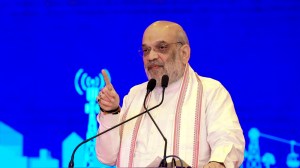Supreme Court rejects Delhi Police appeal to cancel bail of journalist accused of spying for China
On April 4, a bench of Justices Bela M Trivedi and P B Varale dismissed the plea seeking cancellation of the default bail granted to Sharma and also directed the trial to be expedited.
 Freelance journalist Rajeev Sharma in New Delhi (Photo: PTI/File)
Freelance journalist Rajeev Sharma in New Delhi (Photo: PTI/File)The Supreme Court has dismissed a Delhi police appeal challenging the bail granted to journalist Rajeev Sharma, who was arrested on charges of spying for Chinese intelligence and being in possession of classified documents related to national security.
On April 4, a bench of Justices Bela M Trivedi and P B Varale dismissed the plea seeking cancellation of the default bail granted to Sharma and also directed the trial to be expedited.
The Delhi HC granted bail to Sharma on December 4, 2020 after the police failed to file a chargesheet within 60 days of his arrest. He was arrested on September 14, 2020 and charged under the Official Secrets Act.
The Delhi police challenged this before the SC which issued notice on January 29, 2021.
As per the prosecution case, during the search of his house, some sensitive/confidential documents related to the Indian defence department were recovered. Further investigation revealed that Sharma procured secret/confidential/sensitive documents/material information and conveyed the same to Chinese intelligence officers, and in lieu of this he was getting remuneration through hawala transactions/funds routed through shell companies being run/operated by Chinese nationals, in Mahipalpur, Delhi, said the police.
According to the police, Sharma was in contact with Chinese officers Michael, Xou and George through emails and platforms like Telegram, WhatsApp etc.
On a request, the Director General of Military Intelligence (DGMI) confirmed that the documents recovered from Sharma were classified, the police said, adding that the DGMI said the contents were directly or indirectly connected with security matters and any unauthorised disclosure could cause damage to national security or prejudice national interests or embarrass the government in its functioning.
In November 2020, Sharma approached the trial court seeking default bail as the police had not filed chargesheet in the case within 60 days, but the court dismissed it saying the 60-day period had not expired. He moved the Patiala House courts where the Duty Metropolitan Magistrate too dismissed it saying the duration for filing the chargesheet in the offence would be 90 days. Sharma later moved the HC.
He cited the 2017 SC ruling in Rakesh Kumar Paul vs State of Assam, which dealt with the issue of default bail while interpreting Section 167 of the Code of Criminal Procedure regarding the time limit for filing chargesheet – 60 days or 90 days.
Section 167(2)(a) CrPC says the Magistrate may authorise the detention of the accused person, otherwise than in the custody of the police, beyond the period of 15 days if he is satisfied that adequate grounds exist for doing so. However, no Magistrate shall authorise the detention of the accused person in custody under this paragraph for a total period exceeding 90 days, where the investigation relates to an offence punishable with death, imprisonment for life or imprisonment for a term of not less than 10 years, or, 60 days, where the investigation relates to any other offence.
The HC did not agree with the state’s contention that it had 90 days to file the chargesheet in the case and said the same had to be filed in 60 days. Accordingly, it set aside the magistrate court order and granted him default bail.
Appearing for Sharma in the Supreme Court, Advocate Shikhar Garg said as no minimum sentence is prescribed for the offence under the Official Secrets Act, the test as laid down in Rakesh Kumar Paul case was not met and therefore, he was entitled to default bail as the chargesheet was not filed within 60 days from date of arrest.








